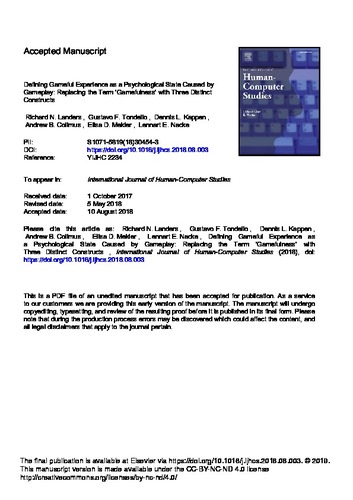UWSpace will be migrating to a new version of its software from July 29th to August 1st. UWSpace will be offline for all UW community members during this time.
Defining gameful experience as a psychological state caused by gameplay: Replacing the term ‘Gamefulness’ with three distinct constructs
| dc.contributor.author | Landers, Richard | |
| dc.contributor.author | Tondello, Gustavo F. | |
| dc.contributor.author | Kappen, Dennis L. | |
| dc.contributor.author | Collmus, Andrew | |
| dc.contributor.author | Mekler, Elisa D. | |
| dc.contributor.author | Nacke, Lennart | |
| dc.date.accessioned | 2020-01-21 22:26:47 (GMT) | |
| dc.date.available | 2020-01-21 22:26:47 (GMT) | |
| dc.date.issued | 2019-07 | |
| dc.identifier.uri | https://doi.org/10.1016/j.ijhcs.2018.08.003 | |
| dc.identifier.uri | http://hdl.handle.net/10012/15520 | |
| dc.description | The final publication is available at Elsevier via https://doi.org/10.1016/j.ijhcs.2018.08.003. © 2019. This manuscript version is made available under the CC-BY-NC-ND 4.0 license http://creativecommons.org/licenses/by-nc-nd/4.0/ | en |
| dc.description.abstract | Background and Aim Gamefulness is commonly cited as the primary goal of gamification, a family of approaches employed in education, business, healthcare, government, and elsewhere. However, gamefulness is defined imprecisely across the literature. To address this, we present a theory of gamefulness that splits gamefulness into more specific constructs and outlines their effects in a process model. Method We integrate extant literature from psychology, human-computer interaction, and other fields to define gameful design, systems, and experiences. Most critically, we argue that gameful experience is the core focal construct of this theory and define it as an interactive state occurring when a person perceives non-trivial achievable goals created externally, is motivated to pursue them under an arbitrary set of behavioral rules, and evaluates that motivation as voluntary. Results We present six resulting propositions: (1) gameful systems lead to gameful experiences, (2) gameful systems impact psychological characteristics, (3) effective gameful design leads to gameful systems, (4) effective gameful systems lead to behavioral change, (5) appropriate behavioral change causes the distal outcomes gamification designers target, and (6) individual differences moderate the effectiveness of gameful systems. Conclusion Gameful experience theory provides researchers with a unified foundation to study gamification from any social scientific lens. | en |
| dc.language.iso | en | en |
| dc.publisher | Elsevier | en |
| dc.rights | Attribution-NonCommercial-NoDerivatives 4.0 International | * |
| dc.rights.uri | http://creativecommons.org/licenses/by-nc-nd/4.0/ | * |
| dc.subject | gamefulness | en |
| dc.subject | gamification | en |
| dc.title | Defining gameful experience as a psychological state caused by gameplay: Replacing the term ‘Gamefulness’ with three distinct constructs | en |
| dc.type | Article | en |
| dcterms.bibliographicCitation | Richard N. Landers, Gustavo F. Tondello, Dennis L. Kappen, Andrew B. Collmus, Elisa D. Mekler, Lennart E. Nacke, Defining Gameful Experience as a Psychological State Caused by Gameplay: Replacing the Term ‘Gamefulness’ with Three Distinct Constructs, International Journal of Human-Computer Studies (2018), doi: https://doi.org/10.1016/j.ijhcs.2018.08.003 | en |
| uws.contributor.affiliation1 | Faculty of Mathematics | en |
| uws.contributor.affiliation2 | David R. Cheriton School of Computer Science | en |
| uws.contributor.affiliation2 | Games Institute | en |
| uws.typeOfResource | Text | en |
| uws.peerReviewStatus | Reviewed | en |
| uws.scholarLevel | Faculty | en |


